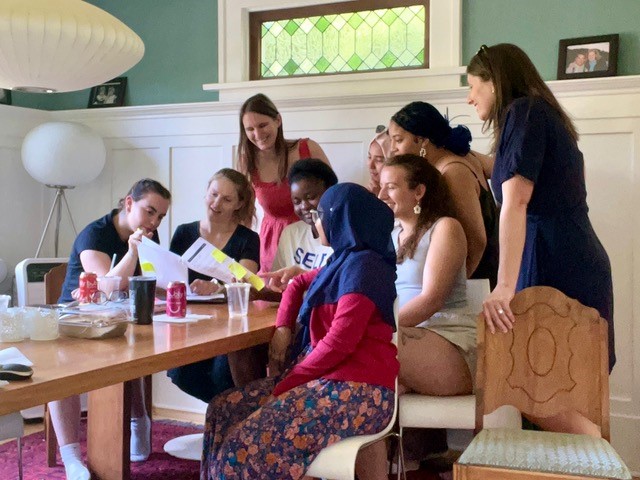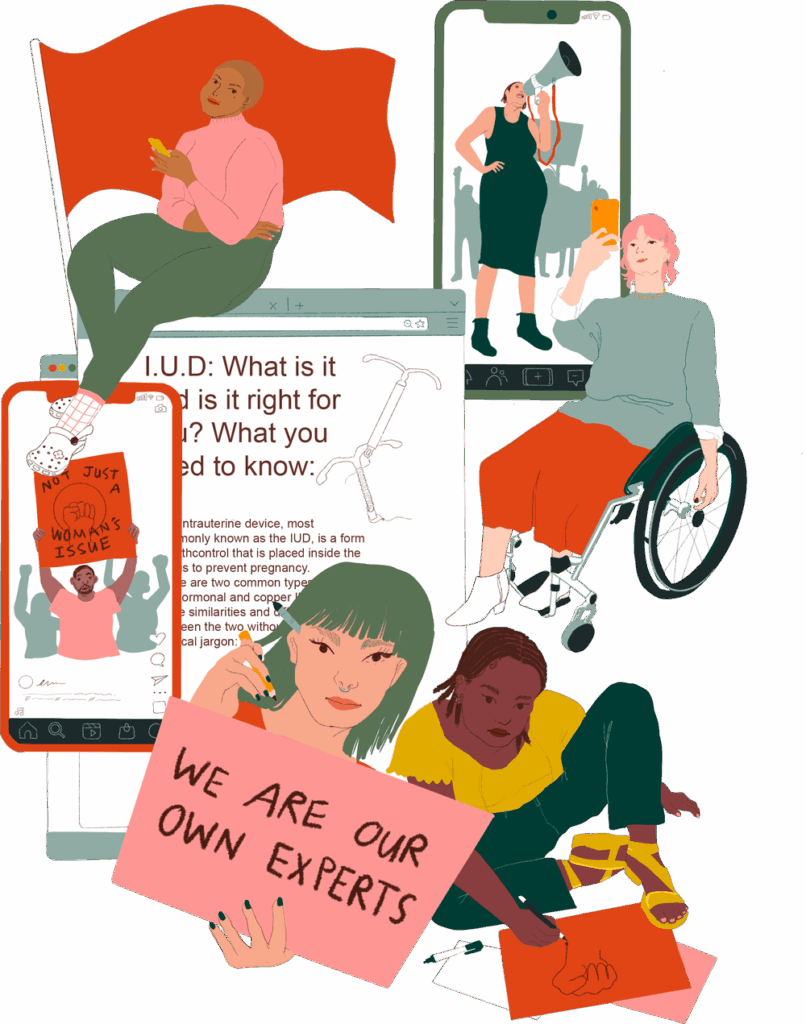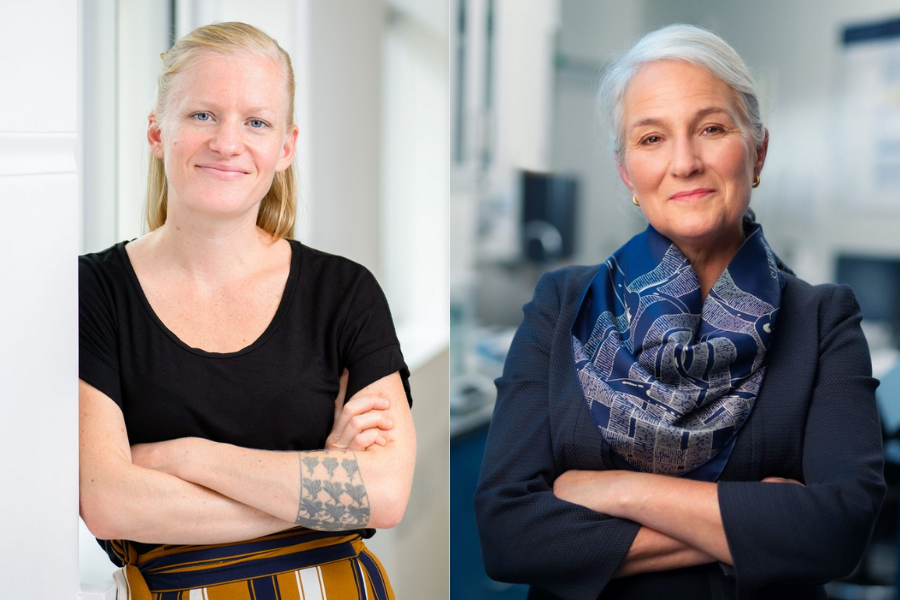
Featured image illustrated by Jesseca Buzoin.
World Contraception Day, September 26, is an annual day to recognize contraception access as an important driver for women’s health and global health equity.
Unplanned pregnancy is economically costly, and is associated with worsened health outcomes, not only for birthing parents, but also for their children and partners. Reliable access to contraception gives people the ability to choose whether or when to have children, thereby reducing unplanned and unwanted pregnancies.
Despite this, access to contraception remains a challenge for many people in Canada and around the world. Social stigma and misinformation about different contraceptive methods can make it harder for people to make informed decisions.
Today, we’re celebrating the many WHRI researchers who are working hard to close the contraception gap and create meaningful policy changes. Special thanks to Dr. Sarah Munro and Kaiya Jacob, Lead Youth Advisor for the Ask Us project, for sharing their experiences with us for this article.

The Reproductive Choices Lab
Led by WHRI member investigator Dr. Sarah Munro, the Reproductive Choices Lab brings together health professionals, scholars, students, and community partners to generate evidence supporting individuals to make informed reproductive choices. The lab explores these topics through a justice-oriented lens and focuses particularly on breaking down barriers to reproductive healthcare faced by Indigenous and racialized people, 2SLGBTQIA+ people, and folks living in rural and remote communities.
Based at the University of Washington School of Public Health, the lab also has space at WHRI’s offices on the BC Women’s Hospital campus, and at the University of British Columbia’s Department of Obstetrics and Gynaecology.
Ask Us Project
The Ask Us Project is a 4-year study by the Reproductive Choices Lab that began in 2022. The project seeks to understand youth attitudes toward contraception, how youth choose their contraceptive method, and how we can shape future public health policy to improve contraception access specifically for youth.
Building Trust

Thanks to CIHR funding, researchers were able to devote significant time and effort to building trust and relationships with youth in communities across Canada. Under the guidance of Dr. Munro, a team of Youth Peer Researchers was assembled from community members with similar lived experience to the target study participants. They were hired into staff roles as equal members of the research team. These youth worked over a period of several months, researching and reaching out to different youth-serving organizations across Canada, developing survey questions, and practicing their interview skills.
Findings
Interviews conducted as part of the Ask Us Project support the idea that contraception is important to youth. The sample of 79 youth and 27 health care professional interview participants who contributed to the study demonstrated high engagement and critical thought around options for contraception.
Notably, the barriers that youth face in accessing contraception are different from those faced by adults. While cost is a well-established barrier, youth are additionally susceptible to social and cultural stigmas around sex. Many youth are wary of the cultural optics of seeking contraception as members of their age group, and are motivated to seek options that are discreet, “grab-and-go,” and can be obtained without a healthcare appointment. Some noted that while pharmacy prescribing is helpful for avoiding a doctor’s visit, obtaining contraception from a pharmacist in a public shop still puts them in a visible, and potentially vulnerable position. This risk is amplified for youth living in rural and remote communities, where they are more likely to be recognized by a pharmacist or other shop patrons.
Youth are in the process of getting used to contraception, and are drawn to methods that feel more approachable, like condoms and oral contraceptives. While many providers want to acknowledge that Long-Acting Reversible Contraceptives (LARCs) such as IUDs are more effective, the choice to have an IUD implanted can feel like a bigger decision for youth. It’s important for providers and parents to trust that youth are making thoughtful and deliberative choices about their contraceptive methods.
Male and AMAB study participants also showed keen interest in more male-led options for pregnancy prevention, beyond condoms. Participants of all genders noted that contraception often feels like a burden that girls, women, and AFAB individuals are expected to bear, rather than a collaborative choice between sexual partners.
Next Steps
With the Ask Us project set to wrap up next year, Dr. Munro and her team are moving toward knowledge-sharing and implementation. The team is planning a series of video stories for social media which will be aimed at youth as well as prescribers and policymakers. The hope is that sharing these stories will encourage further policy shifts to improve youth access to contraception – and shift the cultural narrative away from shame and toward open dialogue. We look forward to amplifying more findings from the Reproductive Choices Lab!


Contraception Access Advancements in BC
Access to contraception has improved in the past 2 years for people throughout BC, thanks in large part to the efforts of WHRI member Dr. Wendy Norman. As a family physician, Dr. Norman recalls frequently seeing patients dealing with unexpected or unplanned pregnancy.
In a recent CIHR feature, Dr. Norman details how she turned to research in an effort to solve the problem. Her research indicated that providing funding for universal contraceptive coverage could save the government around $27 million annually, compared to the costs of managing unwanted pregnancies.
WHRI member Dr. Laura Schummers recently validated the benefits identified in Dr. Norman’s work. Earlier this year, Dr. Schummers and her team published a study earlier that showed a significant increase in LARC uptake across the province, since the removal of cost as a barrier. This story was picked up by several news outlets, demonstrating the significant impact that research can have on real-world policy.
We’re proud of the work that WHRI researchers have accomplished thus far in the field of contraception, and look forward to even greater advancements.